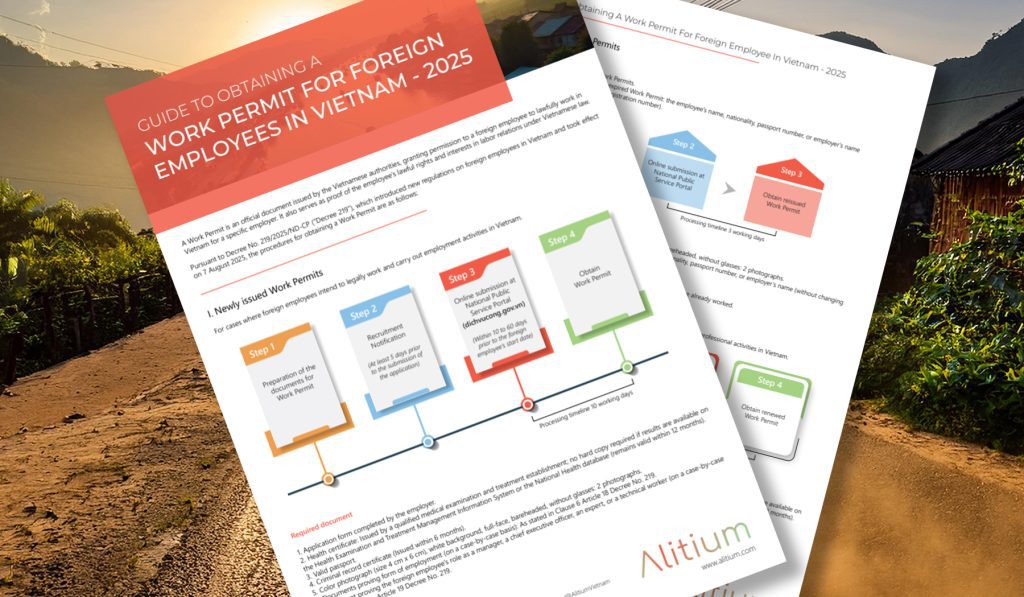Vietnam’s New VAT Framework from 2025
On November 26, 2024, during the 8th session of the 15th National Assembly in Hanoi, Vietnam introduced significant updates to its Value-Added Tax (VAT) Law. Comprising four chapters and 17 articles, this revised legislation marks a pivotal shift in the country’s tax framework and is set to take effect on 1 July 2025. While the official text will be released by mid-December 2024, initial announcements hint at transformative changes poised to impact businesses and investors alike.
This article explores the provisional highlights and what they mean for Vietnam’s economic landscape:
Click here to download this article as PDF: VAT Law Changes in Vietnam
1. A Boost for Small Business: Doubling the Tax-Exempt Revenue Threshold
The new VAT Law introduces a notable increase in the revenue threshold for VAT exemptions. Currently set at VND 100 million per year for business households and business individuals, the exemption threshold inreases to VND 200 million per year. This adjustment reflects the growth of Vietnam’s GDP and Consumer Price Index (CPI) and aims to better align the tax system with economic developments, reducing the burden on smaller businesses while enhancing compliance.
2. Clarity for VAT Timings
The amended law has revised and clarified the timing for certain elements of VAT calculations. Under the new regulations:
- For Goods: VAT liability arises when ownership or usage rights transfer to the buyer, or at the moment an invoice is issued- regardless of payment status.
- For Services: VAT is determined upon completion of services or the issuance of an invoice, independent of payment timelines.
3. Tightening Controls: Prohibited Actions for Tax Deductions and Refunds
To bolster transparency and integrity, the revised VAT Law introduces stringent measures to combat fraudulent activities, emphasizing ethical compliance. Prohibited actions include:
- Buying, selling, giving, advertising, or brokering the sale or purchase of invoices.
- Engaging in fake transactions for the purchase or sale of goods or services, or conducting transactions that do not comply with legal regulations.
- Issuing invoices for goods or services during a temporary suspension of business operations, except when issuing invoices for contracts signed prior to the suspension notification.
- Using illegal invoices or documents, or improperly using legitimate invoices or documents as regulated by the Government.
- Failing to transmit electronic invoice data to tax authorities as required.
- Altering, misusing, accessing without authorization, or destroying information systems related to invoices and documents.
- Offering, accepting, or brokering bribes, or committing other acts involving invoices or documents to claim tax deductions, refunds, misappropriate tax funds, or evade VAT
4. Tackling E-commerce VAT Exemptions
The revised VAT Law addresses an emerging concern in the digital economy. In light of the rapid growth of e-commerce, the government has eliminated the VAT exemption for these low-value imports. The annulment of Decision No. 78/2010/QD-TTg, is a critical step in strengthening tax administration and ensuring that foreign e-commerce platforms comply with Vietnam’s tax regulations.
5. Reforming VAT for Fertilizers & Agricultural Machinery
The change that involved the most debate was adjustments to the VAT treatment of fertilizers. The Standing Committee of the National Assembly highlighted that applying a 0% VAT rate to fertilizers, while beneficial for both domestic producers and importers by allowing VAT refunds on inputs, poses a challenge. It would require government expenditure for tax refunds and contradicts the foundational VAT principle that a 0% rate should only apply to exports, not domestic consumption. Instead, a 5% VAT rate on fertilizers, agricultural machinery, and offshore fishing vessels gained broad support, with 72.67% of National Assembly deputies in favour of the new rate. This move sought to strike a balance between fiscal responsibility and tax system integrity.
The 2024 VAT Law marks a pivotal step in Vietnam’s efforts to modernize its tax framework. By simplifying compliance for small businesses, aligning taxation policies with economic growth, and addressing evolving market conditions, the law aims to create a more balanced and efficient VAT regime. Businesses are encouraged to consult tax experts to fully understand these changes and prepare for their implementation on July 1, 2025.
The above content is a summary of the Amended Value-Added Tax (VAT) Law, based on publicly available information and proceedings from the National Assembly’s discussions. It is derived from the published record, and while every effort has been made to ensure accuracy, minor discrepancies may still arise.
Your input and feedback are highly valued and will help refine the understanding of this significant legislation. Please note that the official text of the Amended VAT Law will be released in due course and should be referred to as the authoritative source.
Phuong Vo is Managing Partner at Alitium, and brings more than a dozen years of advising and assisting foreign investors enter and remain compliant in Vietnam. Contact Phuong via Alitium.com for further assistance and advice.








